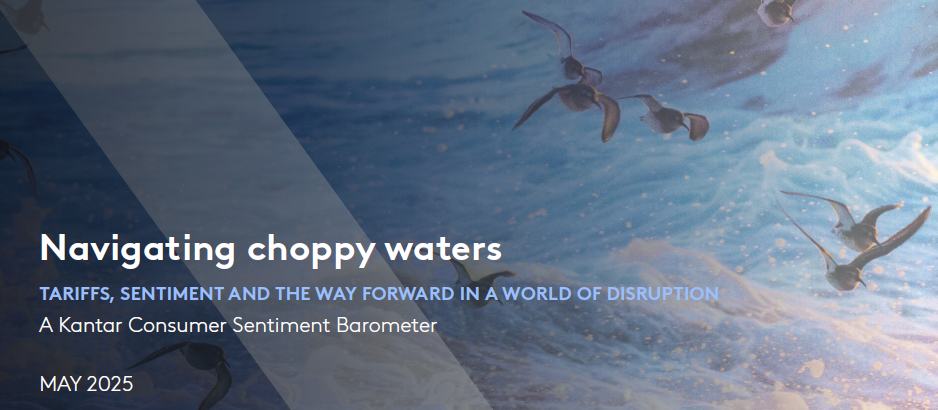Download the complimentary booklet
Tariffs driving Kiwis away from US products to buy more local
In response to tariffs, 27% of New Zealanders claim they’ll stop buying US products and services and 47% will buy more locally.
Kantar’s Consumer Sentiment Barometer reveals that three quarters of New Zealanders (76%) still feel prices are rising and that rising energy costs (64%), business profiteering (61%) and economic policies (51%) are driving up the cost-of-living.
Kantar has released a new Consumer Sentiment Barometer focused on the tariff turmoil, across 21 markets globally, which reveals that over a quarter of New Zealanders (27%) claim that they will stop buying US products and services and almost half that they will buy more local products and services (47%).
Tariffs are adding to the overarching theme of generalised economic unease and worry about global conflicts. Even if tariffs aren’t a main concern, consumers see them as a contributing factor to general economic woes. A key concern in New Zealand is that sentiment around rising prices, especially for many household essentials, is still sharply negative with three quarters (76%) noticing some or a lot of higher prices.
The Barometer data shows an acceptance to reduce buying behaviour especially on big ticket items like cars, tech items and overseas holidays. And while it is easy to anticipate cutbacks to happen on big ticket items, even day-to-day items are feeling the heat; for example, new clothes (43%), fast food and takeaways (39%), streaming services (37%) and a few drinks in a bar (38%).
No brand is safe as people globally are already cost-cutting, bargain hunting and trading down due to ongoing cost-of-living pressures. The Barometer does reveal however, marked differences in drivers of behaviour across the world. Here in New Zealand, a half (48%) of people are deliberately looking for price reductions, while two in five are making cutbacks in general expenditure (42%) and just stopping some classes of expenditure altogether (38%). Consumers locally feel that rising energy costs (64%), business profiteering (61%) and economic policies (51%) are driving up the cost-of-living.
In response, while three quarters of consumers expect the government to support Kiwis through a variety of tax, direct support and stimulus activities, two thirds also expect businesses to take action – primarily through doing what they can to keep prices low, and by paying employees fairly.
The Kantar Consumer Sentiment Barometer was run in 21 markets and reveals that globally, the tariff turmoil blame is squarely aimed at the US (71%) but varied feelings in local markets towards their own government’s response. There is – unsurprisingly – particularly positive approval of government responses in Canada and Mexico. Across APAC, both Japan and South Korea are the prominent markets where consumers report issues with Japan (60%) highest for expecting their economy to worsen next year. Markets where consumers feel most comfortable about the economy and meeting their outgoings are India, Saudi Arabia and the UAE.
Kantar’s research also reveals five key learnings that separate the companies that find opportunity in turmoil and those that become a victim of it.
- They are meaningfully different to more people. Understand what you’re up against. As costs increase, some brands might become more discretionary. Market understanding is key: make sure you’re clear on your competitive set and positioning.
- They don’t go dark. Investing in your brand equity is essential. While it might be tempting to ‘go dark’, reducing ad spend significantly extends recovery. It erodes awareness and base sales, requiring time (and investment) to build back up.
- They get a grip on pricing power. Your pricing power will influence the margins you can maintain if tariffs are imposed on your market. Strong pricing power means consumers are less likely to opt for cheaper alternatives. Don’t opt for immediate discounting; constant promotions are often unsustainable.
- They make creative count. Take another look at how you present the value of your brand through your communications. If your competitor’s brand is produced overseas at a lower cost, it could harm their reputation.
- They find new space for their brand. Assess your brand and category to identify new markets or untapped needs where your brand might have an edge. Innovation may be needed for new variants or to stretch into new categories, if your brand is already well-established.
About the Consumer Sentiment Barometer: The Kantar Consumer Sentiment Barometer provides a local and global view of people’s changing attitudes and responses to the various stages of tariff turmoil. Initially covering ~10,000 people across 21 countries, the Barometer provides unique insights into consumer behaviour to help brands understand how their marketing strategy should evolve. n=500 for all markets except for USA (n=1,000) and China=120. Fieldwork was undertaken in April-May 2025.
The findings are based on data collected through Kantar’s proprietary Standpoints panel that provides timely and trusted insights into the views of everyday New Zealanders. Standpoints panel gives Kiwis a voice on the issues that matter most, and anyone interested in shaping the future of brands, policy, and society and have their say is encouraged to visit Standpoints.co.nz to join the panel.

